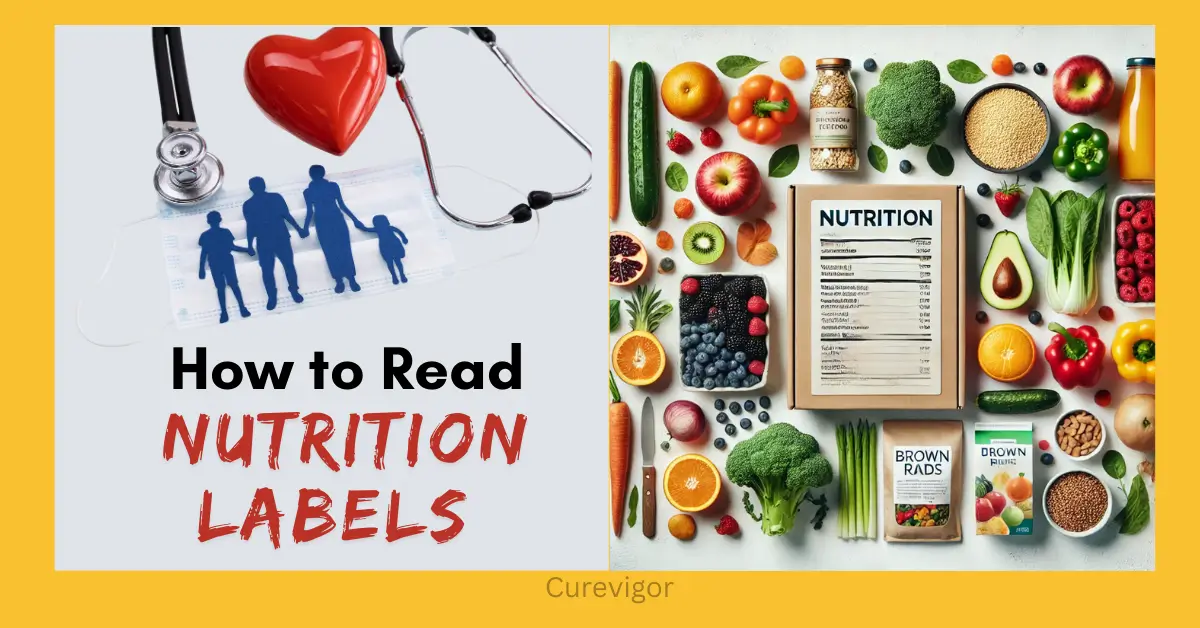Learn how to read nutrition labels like a pro! Decode serving sizes, hidden sugars, and marketing traps to make confident, healthy food choices.
Thank you for reading this post, don't forget to subscribe!Confused by food labels? This friendly guide teaches you how to spot hidden sugars, avoid marketing tricks, and choose healthier options every time you shop.
The blog text is clear, supportive, and actionable, offering relatable examples and practical tips that empower you to make healthier food choices.
Health-conscious consumers will remember.
- How to decode nutrition labels for healthier choices.
- Common marketing traps and misleading food claims.
- Simple, actionable steps to improve label-reading skills.
Introduction: Decode Your Diet, Transform Your Health
Are you ever standing in a grocery aisle, flipping a box of cereal or a protein bar, and thinking: What on earth does all this mean?
Terms like net carbs, sucralose, or partially hydrogenated oil can feel more like a chemistry lesson than food information. You’re not alone—millions of people feel overwhelmed, misled, or downright confused when trying to make healthier choices.
The truth? Companies know this. They bank on marketing tricks and flashy claims to grab attention, while the actual nutrition label—the part that matters—often gets ignored.
Once you learn to read nutrition labels, you’ll spot “sugar bombs” disguised as healthy snacks, recognize good and bad fats, and buy with confidence.
This isn’t about obsessing over every calorie—it’s about feeling empowered and making small, smart swaps that add up to big health wins.
If you want to manage your weight, support heart health, or just stop falling for marketing traps, this guide is for you.
Why Mastering Nutrition Labels Is Your Superpower
Learning how to read nutrition labels is like having a secret decoder ring for your health. Here’s why it matters:
- Take Control of Your Health: Stop being misled by packaging and start making intentional choices.
- Prevent Chronic Diseases: High sodium, hidden sugars, and trans fats are silent contributors to heart disease, diabetes, and obesity. Reading labels is a frontline defense.
- Support Your Weight Goals: Whether you’re counting calories or balancing macros, nutrition labels give you the numbers you need.
- Save Money and Regret: Ever buy “healthy” granola only to find out later it’s loaded with sugar? Label literacy prevents that.
Real-life example: My friend Sarah once swapped her favorite “low-fat” yogurt (which had 18g of added sugar per cup!) for plain Greek yogurt topped with fruit. Just from understanding the label, she cut her sugar intake dramatically without giving up her morning snack.
The Anatomy of a Nutrition Label: Your Map to Health
A nutrition label looks intimidating at first glance, but once you break it down, it’s surprisingly straightforward. Let’s go step by step:
Serving Size & Servings Per Container

- Why it matters: Everything on the label is based on this number. If a “small” bag of chips says serving size: 1 oz (about 15 chips), but the bag has 3 servings, eating the whole bag means triple the calories and sodium.
- Reality check: Many people unknowingly eat double or triple the serving size.
Calories
- This shows the amount of energy per serving.
- For most adults, 2,000 calories a day is often used as a reference point, but individual needs can differ significantly based on age, activity level, and personal health goals. It’s beneficial to consult a nutrition professional or use online calculators for a more personalized approach.
- Example: If you’re tracking for weight loss, 250 calories from a snack may not seem like much—but if the serving size is misleading, you could be eating 500+ calories without realizing it.
Total Fat (and Subcategories)
- Saturated Fat: Limit to protect heart health. Found in butter, cheese, fatty meats.
- Trans Fat: The worst offender. Even if it says “0g trans fat,” check the ingredients list for partially hydrogenated oil—a sneaky sign it’s still there.
- Unsaturated Fats: These are the good guys! Olive oil, nuts, and avocado help reduce inflammation.
Cholesterol
- Important but often misunderstood. Moderate intake is fine for most, but pairing it with high saturated fat can increase risk. For individuals with specific health conditions like high cholesterol, it is advisable to consult a healthcare provider for personalized guidance. This can ensure safe and effective dietary choices.
Sodium
- A major player in blood pressure. Aim for less than 2,300mg per day.
- Processed soups, frozen meals, and sauces are notorious sodium bombs.
Total Carbohydrates (and Subcategories)
- Dietary Fiber: The MVP. High-fiber foods keep you full, regulate blood sugar, and improve gut health. Adults should aim for 25–30g daily.
- Total Sugars vs. Added Sugars: Natural sugars (like in fruit) aren’t the same as added sugars (like in soda). Always check the “added sugars” line—experts recommend keeping them under 10% of daily calories.
Protein
- Essential for muscles, energy, and repair.
- Reality check: Many “protein bars” rely on added sugars and cheap fillers. A boiled egg or nuts may be a better, cleaner protein source.
Vitamins & Minerals
- Labels highlight Vitamin D, Calcium, Iron, and Potassium.
- Look at % Daily Value: it tells you how much of your daily needs you’re getting.
Deciphering the % Daily Value (%DV): Your Nutritional Compass
%DV is your quick shortcut:
- 5% DV or less = Low. Example: A soup with 3% sodium is low in salt.
- 20% DV or more = High. Example: A cereal with 25% DV of fiber is excellent.
Personal tip: I use this rule when comparing cereals. One brand may look great in calories but has only 2% fiber, while another gives me 15% fiber per serving. The second one keeps me fuller, longer.
Beyond the Numbers: The Ingredient List Unveiled
Numbers tell part of the story, but the ingredient list is the truth serum.
- Order Matters: Ingredients are listed by weight. If sugar is in the top three, it’s not a health food. Quick tip: If you see several unfamiliar sweeteners in the list, it’s likely high in added sugar, so consider other options.
- Sugar’s Many Names: Watch for dextrose, maltose, cane syrup, agave, and fruit juice concentrate. They all add up.
- Oils: Olive and avocado = good. Soybean and corn oil = more inflammatory.
- Additives & Preservatives: Some are harmless, but others (like BHA, BHT, artificial colors) are worth minimizing.
- Allergens: Always check for hidden milk, soy, nuts, and gluten. Especially important if you’re packing school lunches.
Busting Buzzwords: Marketing Claims vs. Reality
Food companies love buzzwords. Here’s how to see through them:
- “Natural” – Means almost nothing legally. Soda with “natural flavors” is still soda.
- “Organic” – Certified organic means grown without synthetic pesticides, but doesn’t mean it’s low-calorie or sugar-free.
- “Gluten-Free” – A lifesaver for celiac patients, but gluten-free cookies can still be loaded with sugar and fat.
- “Multigrain” vs. “Whole Grain” – Multigrain just means more than one grain (even if all are refined). Always look for “100% whole grain.”
- “Fat-Free” or “Lite” – Often replaced with sugar or salt for taste.

Opinion: I always laugh at “sugar-free” sodas that have a mile-long ingredient list of artificial sweeteners. Just because something is “free” of one thing doesn’t mean it’s good for you.
Putting It All Together: Your Label-Reading Strategy
Here’s how to read nutrition labels efficiently:
- One-Second Scan: Start with serving size, added sugars, and trans fat.
- Deep Dive: Look at fiber, protein, and vitamins if you’re comparing products.
- Compare Products Side by Side: Put two granolas next to each other. The one with higher fiber, less sugar, and better oils wins—even if the calories are similar.
Real-Life Scenarios
- Breakfast Cereal: Choose the one with ≥4g fiber and <6g added sugar per serving.
- Packaged Snack: If sugar is the first or second ingredient, put it back.
- Frozen Meal: Look for sodium under 600mg and balanced protein (10–20g).
Advanced Pro Tips for the Confident Label Reader
If you want to go from good to pro, here’s the next level:
- Net Carbs: For low-carb diets, calculate: Total Carbs – Fiber – Sugar Alcohols.
- Hidden Trans Fats: Look for “partially hydrogenated oil” even if the label says 0g.
- Sugar Alcohols: Common in “sugar-free” snacks. They can cause bloating if eaten in excess.
- Bioavailability: Not all nutrients are absorbed equally (iron from meat vs. spinach, for example). To improve absorption, try pairing plant-based iron sources like spinach with vitamin C-rich foods such as oranges or bell peppers. This combination enhances your body’s ability to absorb iron. Keep balance in mind.
Conclusion: Your Journey to Confident Consumption
You’ve just unlocked the secret language of food packaging. From serving sizes to %DV, from hidden sugars to sneaky buzzwords, you now know how to read nutrition labels like a pro.
The best part? With practice, it becomes second nature. You won’t spend hours in the grocery aisle—you’ll glance, decode, and decide with confidence.
Remember, this isn’t about perfection. It’s about empowerment. Every small choice—a lower-sodium soup, a higher-fiber cereal, a yogurt with less sugar—is a step toward better health.
Next time you shop, try comparing two products using this guide. You’ll be surprised how quickly you can spot the healthier choice.Your turn – What’s one label-reading trick you’ll start using today? Share your experiences or questions with us.
Your insights could help someone else on their journey toward healthier choices. Let’s create a community of informed consumers supporting each other toward better health.
Disclaimer: This article is for informational purposes only and is not a substitute for professional medical advice. Always consult a qualified healthcare provider before making changes to your diet, nutrition, or lifestyle.
Read more articles about Health & Wellness Tips.
You might like to read:

